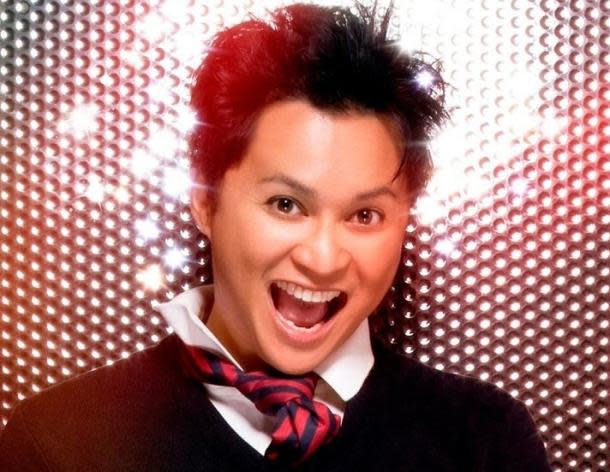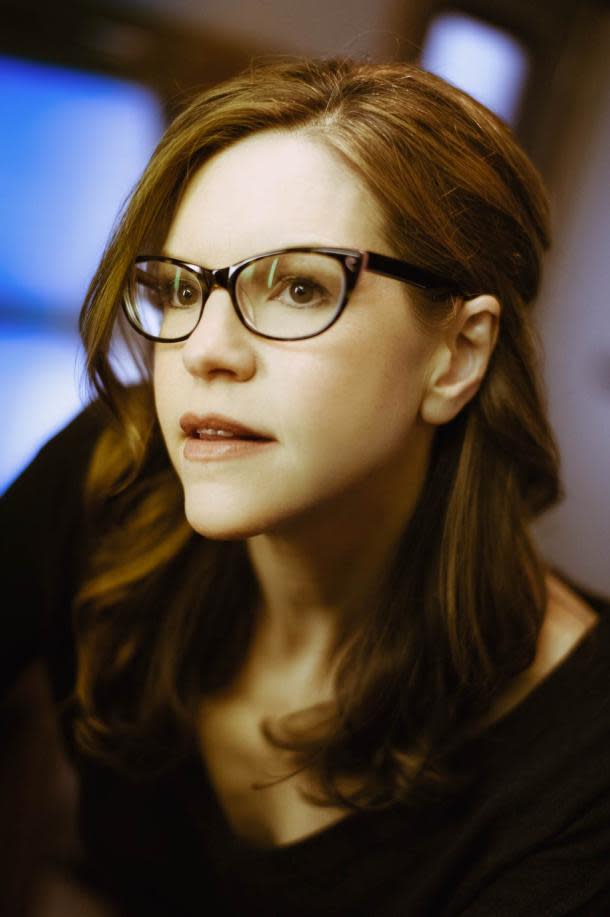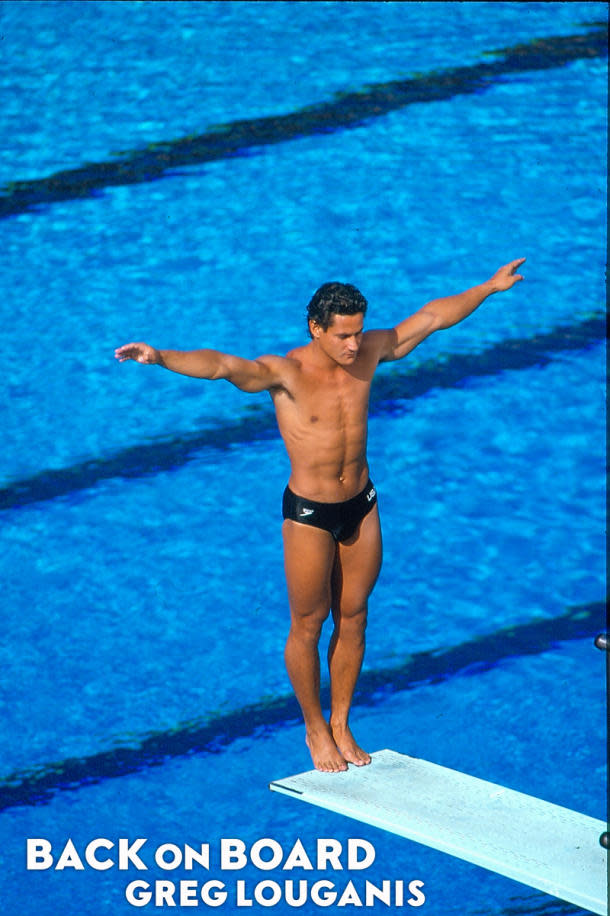Star Apps: Frameline 38
Gay adoption, helicopter moms, and a pioneering gay athlete are just three of the stories at this year's Frameline 38: San Francisco International LGBT Film Festival, taking place June 19-29. Actor Alec Mapa ("Switched at Birth," "Desperate Housewives," and "Ugly Betty") talked to me about what he wants gays and allies to take away from his new documentary, "Baby Daddy." I also spoke with songwriter-actress Lisa Loeb, singer of "Stay (I Missed You)," about co-starring in the hilarious coming-of-age comedy, "Helicopter Mom." And four-time Olympic medalist Greg Louganis talked about recovering from even the worst falls, as documented in his new bio, "Back on Board." For a complete guide to Frameline 38, download the official app (iOS, Android).
Alec Mapa

Alec puts gay adoption on the map with Baby Daddy.
What are the most common misconceptions about gay adoptions that this film clears up?
I think the misconceptions are largely about the kids. Children in foster care experience the highest amount of discrimination. After the age of three, the chances of a child finding a permanent placement decrease, and the chances become slimmer for children of color. A caucasian baby girl is seven times more likely to be placed than an African-American boy over the age of three. These are just regular kids who've lost their homes through no fault of their own.
Zion came to live with us when he was five, terrified, and sad. As soon as he knew he was safe and loved, he had a chance to be just like any other kid, and we had the chance to become a family. By showing our family onscreen, hopefully the idea of adoption through foster care becomes less intimidating. We're just your regular same-sex parent, tri-racial family.
What do you hope gays and allies take away from the film? What do you want opponents to take away?
I want our allies to know that foster adoption is a great choice for LGBT people. Recent polling showed that 2 million LGBT individuals have expressed interest in foster adoption. With 100,000 kids nationwide in need of placement, our community has the potential to end this crisis. As far as our opponents go, we'll probably never agree on the gay thing. But we can all agree that every child deserves a safe, loving home.
Why did you want to adopt a child? Was everyone in your life supportive of this decision?
My husband and I always wanted to have children. I think it was naturally the next step for us as a couple, and years before we were placed with Zion, I think we were already yearning to be parents. It was our call. Luckily we got nothing but support from our friends and family. It takes a Village People.
I remember Madonna saying that having a child taught her to be less self-absorbed. What did your child teach you?
So Madonna is less self-absorbed now? That's hilarious. My child has taught me to slow down. There are no quick fixes to raising a human being; everything is gradual and on someone else's timeline. For an instant-gratification junkie like me, that's a huge change of pace. The truth is my life is no longer my own, but I'm 10 times happier. I'm less selfish, but that just means I have less time to focus on things that don't really matter.
I remember when people told single moms that children need fathers. How would you respond to someone saying that your boy needs a mother?
Our son loves women, and I definitely see him benefit from all the strong, fabulous, amazing women in our lives. He came to us longing for softness and gentleness. As gay men not caught up in gender norms, we're uniquely qualified to give him all the kindness, nurturing, and softness he needs. There's enormous strength and power in feminine energy, and the world needs more of it.
Does your son play with iPhone/iPad apps? Which are his favorites?
My son is obsessed with Minecraft. I don't get it. To me it seems like a complete waste of time, but he probably sees all the time I spend on Facebook the same way.
What are your top five mobile apps?
I'm on Twitter, Facebook, and Instagram, because it's the fastest way to let people know what I'm up to and where. Outside of those three, I also like Yelp, because when you're on the road, it's the fastest way to find some place decent to eat. I'd literally be lost without Google Maps.
Lisa Loeb

Singer Lisa Loeb's acting resume gets another lift from Helicopter Mom.
(Credit: Juan Patino Photography)
How did you get involved with "Helicopter Mom"?
Well, initially Salomé Breziner, who directed it, asked me if I would play a part in this film. We met through music. She had directed a live video of my band and knew I had done some acting, so she wanted me to play a teacher, which was a dream come true for me. We also ended up getting to write the theme song to the movie.
Why was playing a teacher a dream come true?
As a musician and an actor who's more of a musician, in the past I've been asked to play myself or a singer-songwriter or a wild rock star. For me as an actor, playing a best friend or a teacher or a mom is more exciting.
As a mom, how do you relate to the theme of the film?
I will say that as a mom, even though I know it's not the best thing to do, I tend to be a helicopter mom, too. I try not to be, but I'm involved. And my kids are very young, so in some cases, it's just for their own safety. But I'm aware of it. I try to just help my kids blossom as people and try not to get in their way. I identify with being concerned with my kids and wanting the best for my kids, but I think that the mom in the movie is too controlling and too involved, especially with the child that age. Hopefully I won't be that controlling when they're that age.
I like that the movie ends ambiguously in terms of the boy's sexual identity.
In retrospect I had a lot of friends that were gay that did not come out back in the '80s. Most of my guy friends were gay, and I didn't know it. I dated a handful of them. Not seriously, but you'd imagine that you'd kiss someone at the end of the night, and it didn't happen. But it's different now. I know kids now who come out when they're kids. But for some kids, they just don't want to deal with it or think about it. And some kids will react in the opposite way when parents are pushing them too far to be open. They just shut down. So it's important for parents to take care of their kids and keep them safe, but also let them express themselves.
The film features "The 90's," one of my favorite tracks from your "No Fairy Tale" album. How do you look back on the '90s?
The song is about not wanting to go backwards in time. I want to move forward. That being said, I still have a great fondness and respect for what happened in the '90s, because that's where I got my start as a professional musician. I love playing the song "Stay" whenever I play live. That's an important song to me, and I know that's led me to a lot of different places. "The 90's" song is about not trying to recapture what you had. It's about trying to move forward.
What do you want audiences to take away from "Helicopter Mom?"
I hope it's a lesson to parents about not being helicopter parents and letting their kids be who they are and not try to label them. Hopefully people are more open about who they are and what they wanna do with their life, and it's not such a big deal. The movie has a sense of humor about it, but I hope that's what they learn.
What are your top five mobile apps?
1. I listen to NPR a lot, because it entertains me and informs me at all times, especially when I'm on the road.
2. I read books on my phone, on my iBooks app. When I travel, it's easier not to have to carry so much around with me.
3. I love Instagram as a way to communicate with my fans visually. I get a variety of people -- maybe a hard rocker and a mom who likes to knit and a girl who likes Hello Kitty, all out there, and they're all communicating with each other on Instagram.
4. I like playing Boggle. It's something I can play with to unwind at night, especially when I'm on a grueling touring schedule.
5. My daughter really likes Donut Doodle. She gets to decorate donuts, using my phone.
Greg Louganis

Diving champion Greg Louganis proves his mettle in Back on Board.
(Credit: BOB Publicity)
What will audiences learn about you from "Back on Board"?
For myself, it's more about sharing my experiences. That's how we learn and grow. We're always making mistakes along the road, and nobody's perfect.
The movie certainly touches on some of your more personal struggles. Going back, is there one that stands out for you as particularly monumental?
Probably my last suicide attempt, when I was 18, in college -- that was probably the most... But once I got off the drama train, I realized that instead of putting all this energy into trying to off myself, I am going to try and figure out why I'm here. That was so totally different. Even dealing with periodic bouts of depression, where suicide comes to mind at times, I know it's not a viable option. I've been on both side of it. I've lost a couple really close people to it. It gives me the courage, where as hard as it is sometimes -- just to muddle through and show up.
What did diving mean to you back in the '80s? Does it mean anything different today?
Diving, for me, was my sanctuary, my safe place. There, I wasn't getting beaten up; I wasn't getting teased.
Today is different, because it's all for fun and grins. It's been years since I've done a lot of that, so I can't have the same expectations that I had back in '88. I'm 54 now, so I like to think I've stayed fit, but not to a world-class level.
One of your most career-defining moments was hitting your head on the diving board back at the 1988 Summer Olympics. What did you learn from that experience?
Jump out [laughs]. No, there was so much going on in that moment in time that it's almost impossible to put into words. Here I am at the '88 Olympic Games, and I'm favored to win two gold medals. It's the first event, and I hit my head on the board. It takes all the confidence out of your sails and knocks you to the ground, but I had to move forward. I couldn't have done it without my coach, who said you have to get up there like you never did that dive. I had to do two more dives in the same direction. It was really challenging. I had been diagnosed as HIV-positive six months prior to that game, and then my coach had stuff that was going on. His mother was in a coma, and he didn't know if he was staying. So there were a lot of emotional issues encircling.
What was it like, competing with HIV, in those days?
I was on AZT, and we knew it wasn't a performance-enhancing drug. Quite the contrary, it was a very depleting medication, like chemotherapy. It was two pills every four hours around the clock, so I was constantly reminded I had a compromised immune system. It's depleting muscle mass, and it's hard on your liver, so it's not desirable. As an Olympian, you're always on the edge of being too injured or sick to be in world-class shape. There's the lethargy -- when it wasn't a training day, I would lay in bed and pull the covers over my head, and it took a lot to pour myself a bowl of cereal. I didn't know how much was the medication and how much was depression and how much was training. It's hard to assess when so much is going on and so much emotionally is going on. Sometimes I have to pinch myself. Who'd have thought that I'd be here 26 years later?
What did it mean to you when the rules were relaxed, so HIV-positive athletes could compete at the Olympics?
It was such relief and also an empowerment of doing the right thing. So it's wonderful to see the sensitivity surrounding HIV and sexual identity being respected. The current Athletes' Advisory Council are really instrumental in getting those rules changed, and it's so great to see the young kids of today having that courage to stand up for other people's rights and stand up for doing the right thing.
What are your top five mobile apps?
Yelp to find a restaurant or a great arts and crafts store. It's great for all those specialty shops. I use Kayak, because if I have someone coming into town, I can track their flight, and it will give me alerts. It's also good for finding cheaper fares. Then social media: Facebook, Twitter, and Instagram -- all of those to stay in touch with fans and friends and sometimes random people. People ask me how I know so and so, and I say, "Facebook." Then they ask, "And you're actually meeting them?" But that's how a lot of people have reached out to me: "This is my story, and you're my inspiration," and I'll reach out back.

